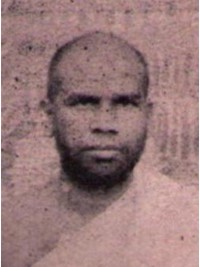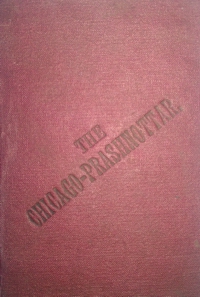59. Question:
How has God been described in ancient scriptures?
Answer:
The Jain Shastras hold that the position of Arhat and Siddha is that of God. How this position is attained, is stated as below. When a soul through a great number of births has been assiduously practising the path of virtue, rectitude and justice according to the teaching of Arhats, and practises the difficult path of twenty virtues in his last third birth aspiring to be an Arhat, it becomes fit to attain the position of a Tirthankar. In course of time such a one is born in a celestial region from where he comes down and takes his birth in a happy, prosperous, noble and good royal family. If in the former birth he has acquired by his meritorious acts a privilege to enjoy worldly pleasures then he has to enjoy the best of worldly pleasures and dominion; If he has not acquired the said privilege, he can enjoy neither worldly pleasures nor power. Such beings as are to attain the position of Arha's, are born with three kinds of knowledge i.e., Mati, Shruta and Avadhi.
He knows by his own knowledge the time when he should adopt Renunciation, if his parents are living he take their permission to retire from the world. If they are not living he takes permission for his holy mission from his brothers or other members of the family. A year before his initiation countless celestial beings come to him and say: "O Bhagvan, show the path of virtue and rectitude." A year after, he enters the path of initiation with great festivities after making bounteous gifts of gold Mohars, but he makes no one his teacher or preceptor as he is himself to be the preceptor of the three worlds. As he is full of knowledge he relinquishes all sins, and practises severest austerities. He destroys all the four kinds of actions that impede soul's progress and becomes self-enlightened. He then preaches truths that lead beyond the net of the world and reveal virtue and rectitude. Such a one is Tirthankar. The acts which help towards the attainment of birth as Tirthankar and the twenty virtues alluded to above and involved in the performance of these acts are as follows:
The acts of reverence and devotion to the seven holy beings and their faithful service. These seven are Arhat, Siddha, Pravachana-sangha, Guru or Preceptor, Sthavir, Bahushruta, and Tapasvi (ascetic). The act of constantly contemplating in one's mind the forms of the above seven. The act of zealous observance of the virtues of right seeing and modesty. The faultless observance of the necessary acts of self-control. The act of constantly observing the Mulaguna (five great vows) and Uttarguna (purification of the body &c). The act of right thinking every hour, every minute and every second throughout life. The act of observing austerities or giving alms to holy persons. The act of observing ten kinds of vows of service. The act of promoting mental peace of the holy teachers and others. The act of acquiring fresh knowledge. The act of spreading with faith the knowledge of Truth. The act of revering the scriptures. The act of constantly following the path that has been preached by Arhats and endeavouring to one's ability to propagate the same. Some secure the ultimate attainment of Tirthankarhood by practising, out of these virtues, one, and some, two, others three and some, all the twenty. Particulars of these are given in such works as the Jnātā Dharmakathā, Kalpasūtra, Avashyaka &c. A Tirthankar never desires any reward for his good acts; his teaching is beneficial alike to a prince and a beggar, a Brahman and a Chandāl and is calculated to take one beyond the ocean of rebirth. The merits of a Tirthankar cannot adequately be described even by such high celestial beings as Indra &c. It is therefore impossible for a man of my little understanding to do them full justice. Even then something is attempted. A Tirthankar is endowed with infinite qualities - a few of which are these: Infinite pure knowledge, infinite pure vision, infinite power of action, infinite fivefold possessions, forgiveness, uncovetousness, uprightness, pridelessness, humility, truth, self-control, selflessness, celibacy, compassion, benevolence, absence of hatred and passions. Equality of disposition towards friend and foe, gold and stone, woman and straw, abstinence from flesh-food and wine and other uneatable things, immovability.
He is the ocean of compassion. He is powerful, valiant, sober, courageous, fearless, devoid of evil-speaking, unegoistic, desirous to save even those who do him ill. This is the description of the form of the Jains' God with body. When the body is discarded, he attains the position of a Siddha who dwells in his own eternal and infinite bliss. The God of the Jains has nothing to do with the creation of the world, or the task of taking incarnations, or the task of punishing or rewarding people according to their merits or demerits or sending them to heaven or hell or showing pride in his being the ruler of the world. This is in brief the description of God as believed in by the Jains. The Naiyayikas and Vaisheshikas consider Shiva to be the God who creates and destroys the world, rewards and punishes men according to their good or evil actions and sends them to heaven or hell, pervades the whole universe, takes periodical incarnations in the world to destroy the wicked and protect the good. The Buddhists believe in a God similar to that of the Jains but they believe in his incarnations in the world, the followers of the Vedas believe that whatever there is in the world is God. The followers of Nir-ishwar Sankhya School and Jaimini philosophy do not believe in God at all.
60. Question:
What view of God can be held according to modern science?
Answer:
The modern science is not opposed to the Jain scriptures; it is in harmony with them. The Arhats have ascribed infinite powers to matter. There was also a work on the subject by the name of Yoniprābhrita Shastra which related to the chemistry of things. What the existing ancient Jain scriptures say is in accordance with science. What has been, is and will be in this world is the result of the combination of matter and spirit. The cosmic laws that are, have been existing from all eternity by the strength of material and spiritual forces. This is why the Jains do not hold God to be the creator of the world. That God is not the creator of the world has already been established by a series of reasoning. If the forces of matter are to be considered God, then the Jains have no objection to it. The Jain belief is not therefore opposed to the conclusion of modern science. If it is contended that all substances, all the forces inherent in them and that all the laws of the world have been created by the power of God, it is repudiated by the argument that no effects come into being without their material causes - an argument recognised valid by all learned men. Matter and spirit are therefore to be accepted eternal. When this has been conceded, the forces inherent in them will have also to be recognised as eternal. These forces manifest and destroy themselves when they get the aid of their concomitant causes such as time, disposition, law, inter action, and mutual combination. According to the modern science the view of God as held by other religionists is found invalid.
 Shrimat Vijyasandsuri
Shrimat Vijyasandsuri
